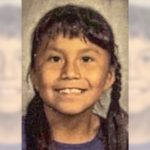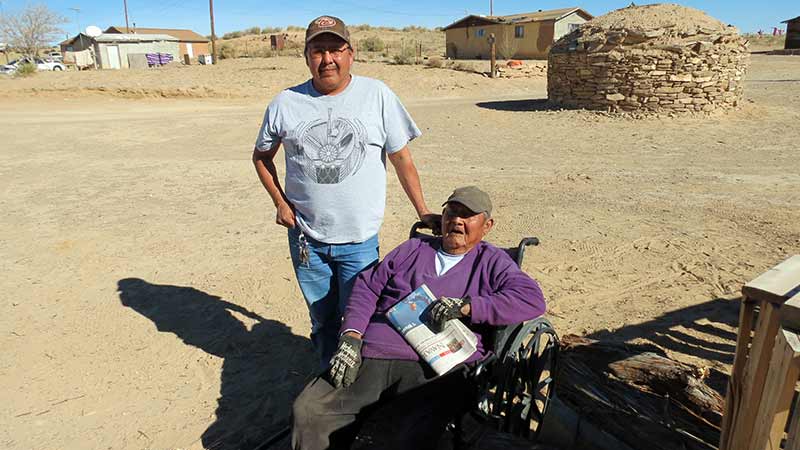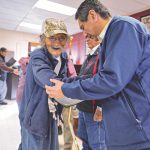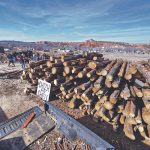
Advocates, experts: Don’t forget human factor

CHR Kirby Smith visits Freddy Begay in To’hajiilee to find out what kind of services he needs. (Special to the Times – Colleen Keane)

CHR Kirby Smith visits Freddy Begay in To’hajiilee to find out what kind of services he needs. (Special to the Times – Colleen Keane)
TO’HAJIILEE, N.M.
“Shima”, (my mother) needs roofing repairs,” Kirby Smith says one morning while visiting Jolene Peralta and other elders at the senior center recently. Smith is one of three community health representatives (CHR’s) who provide health services to about 1500 tribal members in the Navajo community of To’hajiilee located about 30 miles west of Albuquerque. It’s customary for community members and health professionals like Smith to address elders by their familial roles, like shima (my mother), shizhe’e’ (my dad) or shicheii (my grandpa).
“Even when they are chronically ill, people define their lives by the function they retain,
not the function they lost. They define themselves by their communities, their relationships and their values,” said Bruce Chernof, president and CEO of the SCAN Foundation, an organization that is leading the way to reset national long-term care policies. He presented at the annual meeting of the Gerontological Society of America, (GSA) this past November in Washington, D.C.
Chernof, a medical doctor, added that identifying the person by their role in the community rather than the medical model of labeling a patient by their disease or illness (like “he’s a diabetic”) helps the elder maintain their function in the community.
He described function as any activity that a person does during the day – dressing, bathing, eating, cooking, and those things that they value most, like taking care of their grandchildren.
“The three most important words (when working with elders) are dignity, choice and independence. Independence has a different meaning in different cultures,” Chernof said.
For the elders at To’hajiilee, Smith said that more services are needed locally to help elders maintain their function in the community.
“There aren’t enough,” he said.
During the morning get together at the To’hajiilee Senior Center, several elders joined in on the conversation telling Smith in the Navajo language that they also need help with housing repairs, wood delivery, transportation and caregiving so they can continue to live their lives to the fullest.
Smith relayed in English that when they apply for services, they often get denied even though they live on very fixed incomes from social security or pensions.
He said that several elders in the community still have water damage from a major flood last year. Federal funds didn’t cover the damages because they failed to meet FEMA’s cost requirements. FEMA is the federal agency that steps in to help when there are natural disasters.
Later that day, Smith visited Freddy Begay who is in his late 80’s and wheel chair bound. Begay worked for 30 years and has a small pension.
At his home, situated on a hill about a mile down a dirt road, Smith greets Begay traditionally and asks him how he and his wife Rena, who is also in her 80’s, are doing. Begay tells him in Navajo that they still would like help from a caregiver on a regular basis. He’s applied several times over the past years and has been disapproved every time.
“He said he’s about $10 over income to qualify,” Smith translated from Navajo to English.
“People who do these intakes on the applications are not out here visually to see how much in need our elders are,” Smith said.
Smith explained that because To’hajiilee is more than a hundred miles away from the tribal government in Window Rock, Arizona and the state government in Santa Fe, New Mexico, applications for services are often taken over the phone.
“It’s the human factor that should be considered,” Smith said adding that the people who approve or disapprove applications need to make home visits before they make decisions that impact elder’s lives.
“It’s hard,” Begay says to Smith in Navajo telling him that he often tips over in his wheel chair because the ground is uneven around his home.
“We say how much we love and care about our elders and yet all these cuts in staff and meals are taking place,” Smith stated at a recent meeting with Joe Shirley, a candidate for the Navajo Nation presidency.
“We need to focus on the person,” Chernof said at the GSA conference.
“There’s widening inequality,” said Steve Wallace, director of UCLA Center for Health Policy Research, during his presentation at the GSA conference.
Citing a federal report, Wallace said that the federal poverty guidelines are outdated by 20 years. He explained that housing costs vary widely across the country, yet benefits are the same no matter where a person lives.
He suggested the Elder Economic Security Standard index as an alternative, which he said calculates the actual cost of households, food, health care, based on current costs and needs.
A new caregiving program at To’hajiilee may help Freddy and Rena Begay get caregiving services, like cooking and cleaning, but that will depend on whether they meet those requirements.
Smith hopes that they will.
“People like Smith are the people who are on the front lines. They know the community,” said Rena Scott, a community service worker who travels 214 miles from Shiprock, New Mexico to To’hajiilee to provide elders with independent living services like assistive devices.
“When I go to To’hajiilee, I meet up with Kirby. We make home visits and he introduces me to families. My hat is off to the CHR’s,” Scott said.
Smith said that the independent living services Scott brings to To’hajiilee from Shiprock are greatly needed.
“She comes all the way out here to help us. My mom, (referring to one of the elders) here just got approved. She’s getting a handicap ramp and safety rail,” Smith said.
“There needs to be more services like this locally,” he said.
(Editor’s note: Colleen Keane wrote this article through the Journalists in Aging Fellows Program, a collaboration of New America Media and the Gerontological Society of America with support from AARP.)








 Highway 264,
Highway 264, I-40, WB @ Winslow
I-40, WB @ Winslow